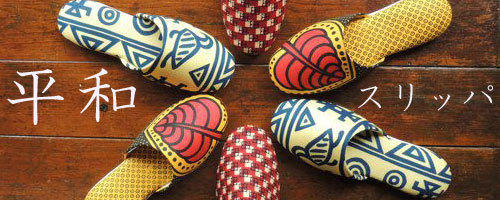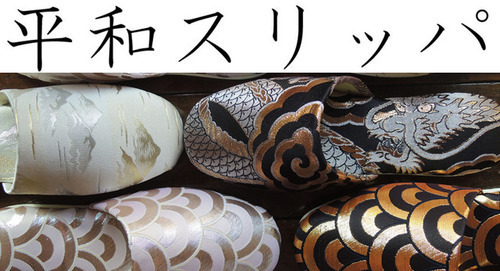
Shoes, socks, barefoot, or slippers in the house? What should we wear indoors?
Shoes, socks, barefoot, or slippers in the house? What should we wear indoors? The question of what to wear or not may appear insignificant at first, but it is actually a familiar and important matter that relates to our lifestyle and values.
In Japan, where we reside, it is an ancient cultural practice and a sign of courtesy to remove shoes inside Japanese homes and refrain from using outdoor footwear indoors. This has the advantage of keeping the rooms clean and preventing stains on the tatami mats.

However, a new question arises: what should be worn (or not) inside the rooms? Some individuals wear socks, while others opt for slippers. There are also those who prefer going barefoot by taking off their socks. This choice may vary depending on the season and the family environment, including the presence of tatami mats.
Nevertheless, it is uncommon in Japan to wear slippers on tatami. This is because it hinders the authentic texture and comfort of tatami and can potentially damage the mat's woven surface. Hence, in households with numerous tatami floors, it is unlikely that many people spend time wearing slippers.
What about countries other than Japan? There are various cultural differences to consider. It is fascinating to compare these practices among different regions. In warmer southern countries, people often spend time barefoot or occasionally wear sandals. In cultures where shoes are worn both indoors and outdoors, individuals might continue wearing the same shoes indoors or opt for socks. Additionally, the decision to remove shoes can be influenced not only by culture but also by personal preferences, individual and family lifestyles, and religious reasons.
In Japan, most families strictly enforce a no-shoes policy indoors, necessitating visitors to remove their outdoor footwear. However, some cultures consider it impolite to ask guests to remain barefoot or in socks. Therefore, many Japanese households provide slippers as a gesture of respect and hospitality.
Slippers may seem insignificant, but they play a significant role. What do you wear in your own room? What do you avoid wearing? In a way, it may be a trivial question, but in reality, it is an intriguing topic that unveils various aspects of culture, religious values, preferences, and lifestyles within households across different countries.
Our slippers are primarily recommended for indoor relaxation, housework, cooking, and for use in the living room. They are also suitable as indoor footwear for visitors. We hope you find a pair of slippers that you truly enjoy!


![Denim Hiroshima Slippers Simple 4 size [Small / Medium / Large / XL]](http://heiwaslipper.com/cdn/shop/files/denimjapan.jpg?v=1729299169&width=533)
![Denim Hiroshima Slippers Simple 4 size [Small / Medium / Large / XL]](http://heiwaslipper.com/cdn/shop/files/preview_images/1ae0c1daf948412ba09abcb7a11771e3.thumbnail.0000000000.jpg?v=1729302385&width=533)
![TATAMI Denim Slippers A-Type [Black Wool Felt Sole] / Simple [Denim Hiroshima]](http://heiwaslipper.com/cdn/shop/products/PXL_20201107_023001463_2ee2ef42-2976-46fd-87fc-68e87a2ffca5.jpg?v=1605611238&width=533)
![TATAMI Denim Slippers A-Type [Black Wool Felt Sole] / Simple [Denim Hiroshima]](http://heiwaslipper.com/cdn/shop/products/cf78773a4e0a4954ae39300afc001a4c.thumbnail.0000000.jpg?v=1635127520&width=533)
![Denim Hiroshima Slippers Simple B-type 3 sizes [Medium / Large / XL]](http://heiwaslipper.com/cdn/shop/files/b-l01.jpg?v=1729395157&width=533)
![Denim Hiroshima Slippers Simple B-type 3 sizes [Medium / Large / XL]](http://heiwaslipper.com/cdn/shop/files/preview_images/2a5d91a1ce44426287679a943b73c146.thumbnail.0000000000.jpg?v=1729397245&width=533)
![Wood summer Indoor slippers YORU [Indoor]](http://heiwaslipper.com/cdn/shop/products/PXL_20220305_023859778_b6eb97cf-5b3f-4cb3-8b27-dc6175a726a3.jpg?v=1676772560&width=533)
![Wood summer Indoor slippers YORU [Indoor]](http://heiwaslipper.com/cdn/shop/products/221dbc310353bfdfe8747210eafe6a96_9611d4d2-ef9b-4b06-b357-9f4f825470c8.jpg?v=1676772560&width=533)
![SALE Open-toe TATAMI Denim Slippers B-Type [Black Wool Felt Sole] / Simple [Denim Hiroshima]](http://heiwaslipper.com/cdn/shop/files/PXL_20240505_024314906.jpg?v=1715241621&width=533)
![SALE Open-toe TATAMI Denim Slippers B-Type [Black Wool Felt Sole] / Simple [Denim Hiroshima]](http://heiwaslipper.com/cdn/shop/files/preview_images/f324a374a59345b0801b7defc8794dac.thumbnail.0000000000.jpg?v=1715242260&width=533)
![Wood Unpainted Natural GETA ZOURI Slippers [Outdoor]](http://heiwaslipper.com/cdn/shop/products/PXL_20230205_021218589.jpg?v=1675997531&width=533)
![Wood Unpainted Natural GETA ZOURI Slippers [Outdoor]](http://heiwaslipper.com/cdn/shop/products/4bd6786738cd4777af9a25d3005e7fec.thumbnail.0000000000.jpg?v=1675736665&width=533)
![Uwabaki Type #01 [Cobalt blue] Japan made school indoor shoes](http://heiwaslipper.com/cdn/shop/files/1_774e840e-b3c1-4a23-b85f-df7b8ceacf02.jpg?v=1734232769&width=533)
![Uwabaki Type #01 [Cobalt blue] Japan made school indoor shoes](http://heiwaslipper.com/cdn/shop/files/2_e1a26258-95fd-461d-a07c-a2028b8334c0.jpg?v=1734232769&width=533)
![Uwabaki Type #01 [Blue] Japan made school indoor shoes](http://heiwaslipper.com/cdn/shop/files/1_b6310388-146d-4db8-8fc6-9efea05e5cdd.jpg?v=1730601209&width=533)
![Uwabaki Type #01 [Blue] Japan made school indoor shoes](http://heiwaslipper.com/cdn/shop/files/preview_images/00ddc0ebe039486ba930ba1484c6abff.thumbnail.0000000000.jpg?v=1730601987&width=533)
![Uwabaki Type #01 [Red] Japan made school indoor shoes](http://heiwaslipper.com/cdn/shop/files/1_b6a613f3-7a33-4747-b00f-9af7dd1dce5f.jpg?v=1734234054&width=533)
![Uwabaki Type #01 [Red] Japan made school indoor shoes](http://heiwaslipper.com/cdn/shop/files/2_d39644c6-6955-4644-98c4-0b1fde3d6db2.jpg?v=1734234054&width=533)
![Uwabaki Type #01 [White] Japan made school indoor shoes](http://heiwaslipper.com/cdn/shop/files/PXL_20231203_013830774_c100938c-224a-4493-8f55-1b7ab4458488.jpg?v=1716432080&width=533)
![Uwabaki Type #01 [White] Japan made school indoor shoes](http://heiwaslipper.com/cdn/shop/files/preview_images/8b07db1bea8544409ca9b26f3995178f.thumbnail.0000000000.jpg?v=1716774889&width=533)
![Wood summer Indoor slippers NATSU [Indoor]](http://heiwaslipper.com/cdn/shop/products/PXL_20220305_023124046.jpg?v=1651713779&width=533)
![Wood summer Indoor slippers NATSU [Indoor]](http://heiwaslipper.com/cdn/shop/products/9c692c421d4941df8a454858964bf24d.thumbnail.0000000.jpg?v=1651713743&width=533)
![Wood summer Indoor slippers Geta Japanese Slippers MIZU [Indoor]](http://heiwaslipper.com/cdn/shop/products/PXL_20220305_025328584_22e0353c-52a9-47a0-8fa5-493a9ffbe5e8.jpg?v=1650773669&width=533)
![Wood summer Indoor slippers Geta Japanese Slippers MIZU [Indoor]](http://heiwaslipper.com/cdn/shop/products/8cb261544b7c4d96b6371a17b4aecace.thumbnail.0000000.jpg?v=1650774131&width=533)
![Medium | Knit up-cycle slippers 2024-M120 [Medium]](http://heiwaslipper.com/cdn/shop/files/1_74e6bb20-9457-4005-b920-1da4aa2fc0d3.jpg?v=1731672250&width=533)
![Medium | Knit up-cycle slippers 2024-M120 [Medium]](http://heiwaslipper.com/cdn/shop/files/4_787e681d-8081-496a-bc25-b24dab67d34f.jpg?v=1731672250&width=533)
![Medium | Knit up-cycle slippers 2024-M119 [Medium]](http://heiwaslipper.com/cdn/shop/files/1_f559f61a-b720-4b6c-9379-974266bdddeb.jpg?v=1731671453&width=533)
![Medium | Knit up-cycle slippers 2024-M119 [Medium]](http://heiwaslipper.com/cdn/shop/files/5_c7010731-884e-4374-a501-69bce7f7164a.jpg?v=1731671453&width=533)
![Medium | Knit up-cycle slippers 2024-M118 [Medium]](http://heiwaslipper.com/cdn/shop/files/1_4f7f701e-bcb4-469a-b9bc-7cfbec1bf50f.jpg?v=1731670790&width=533)
![Medium | Knit up-cycle slippers 2024-M118 [Medium]](http://heiwaslipper.com/cdn/shop/files/4_5526ef4a-899c-4a92-843e-bd5022a7b922.jpg?v=1731670789&width=533)
![Medium | Knit up-cycle slippers 2024-M117 [Medium]](http://heiwaslipper.com/cdn/shop/files/1_da150a42-c6f5-4fc7-95cc-696990456578.jpg?v=1731669514&width=533)
![Medium | Knit up-cycle slippers 2024-M117 [Medium]](http://heiwaslipper.com/cdn/shop/files/4_c8f22448-bb97-4d00-909b-713256757b57.jpg?v=1731669513&width=533)
![Medium | Knit up-cycle slippers 2024-M116 [Medium]](http://heiwaslipper.com/cdn/shop/files/1_77365f74-aab6-4356-9b7f-90ba42d47f4e.jpg?v=1731668957&width=533)
![Medium | Knit up-cycle slippers 2024-M116 [Medium]](http://heiwaslipper.com/cdn/shop/files/5_d910f8da-39c2-4f8f-83f2-f67a4efd89ad.jpg?v=1731668957&width=533)
![Medium | Knit up-cycle slippers 2024-M115 [Medium]](http://heiwaslipper.com/cdn/shop/files/1_22b912db-7a3b-4e60-9efa-290d27cbf2de.jpg?v=1731642622&width=533)
![Medium | Knit up-cycle slippers 2024-M115 [Medium]](http://heiwaslipper.com/cdn/shop/files/2_59ac7cff-bc23-425e-8ad6-2753017e34b9.jpg?v=1731642622&width=533)
![Medium | Knit up-cycle slippers 2024-M114 [Medium]](http://heiwaslipper.com/cdn/shop/files/1_23cd6836-0c59-41e8-b11e-5f1b9a9e1db4.jpg?v=1731641964&width=533)
![Medium | Knit up-cycle slippers 2024-M114 [Medium]](http://heiwaslipper.com/cdn/shop/files/5_63997f3b-9e8b-406d-a486-361737300d21.jpg?v=1731641963&width=533)
![Medium | Knit up-cycle slippers 2024-M113 [Medium]](http://heiwaslipper.com/cdn/shop/files/1_a377de3c-c6f5-4868-bf59-1ad164dd6c67.jpg?v=1731641270&width=533)
![Medium | Knit up-cycle slippers 2024-M113 [Medium]](http://heiwaslipper.com/cdn/shop/files/4_b70af802-9ca5-43bb-8036-d5e8141d55c1.jpg?v=1731641270&width=533)
![Medium | Knit up-cycle slippers 2024-M112 [Medium]](http://heiwaslipper.com/cdn/shop/files/1_2b43d953-aa8c-49ca-9f11-f88334b75ed5.jpg?v=1731639427&width=533)
![Medium | Knit up-cycle slippers 2024-M112 [Medium]](http://heiwaslipper.com/cdn/shop/files/4_c6a2d9e1-8c7a-4060-9950-17817b75ac96.jpg?v=1731639427&width=533)
![Medium | Knit up-cycle slippers 2024-M111 [Medium]](http://heiwaslipper.com/cdn/shop/files/1_99a9047c-a2fd-4843-84d3-2225abfca327.jpg?v=1731638613&width=533)
![Medium | Knit up-cycle slippers 2024-M111 [Medium]](http://heiwaslipper.com/cdn/shop/files/2_47aebdf4-72c8-417e-b084-11ecb43fb627.jpg?v=1731638613&width=533)
![Medium | Knit up-cycle slippers 2024-M110 [Medium]](http://heiwaslipper.com/cdn/shop/files/1_5ce71ce4-d1e1-4e4b-926e-965373d6f956.jpg?v=1731587890&width=533)
![Medium | Knit up-cycle slippers 2024-M110 [Medium]](http://heiwaslipper.com/cdn/shop/files/4_83216e03-5cbf-4018-be81-db22572f752a.jpg?v=1731587890&width=533)
![Medium | Knit up-cycle slippers 2024-M109 [Medium]](http://heiwaslipper.com/cdn/shop/files/1_39fbaa6d-d89d-4252-ba57-4ab08c97e18b.jpg?v=1731587213&width=533)
![Medium | Knit up-cycle slippers 2024-M109 [Medium]](http://heiwaslipper.com/cdn/shop/files/4_69c82117-f469-413e-a9e1-b65ee9be909a.jpg?v=1731587212&width=533)
![Uwabaki Type #01 [Yellow] Japan made school indoor shoes](http://heiwaslipper.com/cdn/shop/files/PXL_20231203_013919940_2cb6643e-3792-4570-a478-48e9292dd66e.jpg?v=1716433566&width=533)
![Uwabaki Type #01 [Yellow] Japan made school indoor shoes](http://heiwaslipper.com/cdn/shop/files/PXL_20231203_013924997_6ec89008-e83d-49be-a754-189a4394f3d7.jpg?v=1716433310&width=533)
![Uwabaki Type #01 [Green] Japan made school indoor shoes](http://heiwaslipper.com/cdn/shop/files/1_0e97bd6f-50fa-4892-865f-d3a8de9c6c47.jpg?v=1730601600&width=533)
![Uwabaki Type #01 [Green] Japan made school indoor shoes](http://heiwaslipper.com/cdn/shop/files/preview_images/a0e1cab212ce428ea71baffd633ef028.thumbnail.0000000000.jpg?v=1730602087&width=533)









